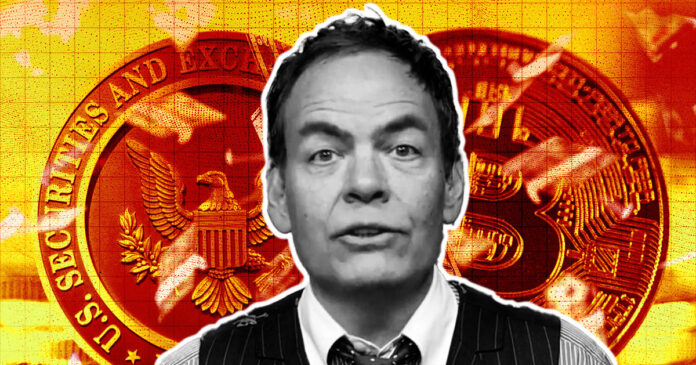Bitcoin-bull Max Keiser gave his take on the absence of a spot BTC Exchange-Traded Fund (ETF) in the U.S., saying it’s “unconscionable” that the Securities and Exchange Commission (SEC) would continue denying applications.
Bitcoin short and futures ETF approved
On June 20, ProShares announced the rollout of the first U.S short Bitcoin-linked ETF, called the ProShares Short Bitcoin Strategy ETF, trading under the ticker BITI.
ProShares CEO Michael L. Sapir said recent market volatility showed Bitcoin can fall in value. BITI enables U.S investors to gain short exposure through a traditional brokerage account.
“BITI affords investors who believe that the price of bitcoin will drop with an opportunity to potentially profit or to hedge their cryptocurrency holdings.”
In October 2021, ProShares were the first to launch a Bitcoin-linked futures ETF, trading under the ticker BITO. Since then, Valkyrie, VanEck, GlobalX, and Teucrium have launched similar products.
As futures ETFs are based on futures contracts, which are financial derivative contracts based on an obligation to buy or sell at a predetermined future date and price, they can differ from the spot price.
Typically futures are cash-settled rather than settled by physical delivery, where a transfer of the underlying asset takes place upon contract expiry. It’s argued that futures tend to favor speculators as a result.
Commenting on the approval of short and futures ETFs, a Grayscale trust, and a pension product, but not a spot ETF, Analyst Will Clemente said the SEC has an agenda against Bitcoin.
So there’s now a SHORT Bitcoin ETF, a Futures ETF, a closed end fund trading at a 30%+ discount, a 401K option for Bitcoin, but NO Spot ETF.
It is clear that @GaryGensler and the SEC have an agenda against Bitcoin.
— Will Clemente (@WClementeIII) June 20, 2022
Keiser criticizes Gary Gensler and the SEC
Speaking to Anthony Pompliano on the Best Business Show, Keiser said futures ETFs are “notoriously horrible” and “almost never work.”
“By allowing things like a futures Bitcoin ETF to exist, futures-based ETFs are notoriously horrible. They almost never work and they’re not suitable for retail, they’re not even suitable for institutions.”
He continued by calling the SEC’s justification for denying spot ETF products “fallacious.” Specifically, Keiser cited the SEC argument that Bitcoin doesn’t have true price discovery.
The SEC has given a list of other reasons as well. For example, in November 2021, the agency wrote that VanEck had failed to meet its obligations under the Exchange Act and the Commission’s Rules of Practice. Therefore investors lacked protections against fraud and manipulation.
Keiser questioned who the SEC is working for, implying that the agency’s actions do not tally with an organization that wants fair and transparent markets. He further suggested that the lack of a spot ETF could be due to possible corruption.
“It seems to me to be some element of corruption here, going on. Obviously, a lot of people don’t want Bitcoin to succeed because it challenges them, and it challenges the banking system. Is that what’s going on?”
Credit: Source link






















 Bitcoin
Bitcoin  Ethereum
Ethereum  XRP
XRP  Tether
Tether  Solana
Solana  USDC
USDC  Dogecoin
Dogecoin  Cardano
Cardano  Lido Staked Ether
Lido Staked Ether  TRON
TRON  Chainlink
Chainlink  Avalanche
Avalanche  Wrapped Bitcoin
Wrapped Bitcoin  Wrapped stETH
Wrapped stETH  Stellar
Stellar  Sui
Sui  Toncoin
Toncoin  Hedera
Hedera  Shiba Inu
Shiba Inu  WETH
WETH  Litecoin
Litecoin  Polkadot
Polkadot  Hyperliquid
Hyperliquid  LEO Token
LEO Token  Bitcoin Cash
Bitcoin Cash  Bitget Token
Bitget Token  Uniswap
Uniswap  USDS
USDS  Wrapped eETH
Wrapped eETH  Ethena USDe
Ethena USDe  Pepe
Pepe  MANTRA
MANTRA  NEAR Protocol
NEAR Protocol  Official Trump
Official Trump  Ondo
Ondo  Aave
Aave  Aptos
Aptos  Internet Computer
Internet Computer  Monero
Monero  WhiteBIT Coin
WhiteBIT Coin  Mantle
Mantle  Ethereum Classic
Ethereum Classic  Bittensor
Bittensor  Cronos
Cronos  Dai
Dai  POL (ex-MATIC)
POL (ex-MATIC)  OKB
OKB 
